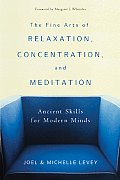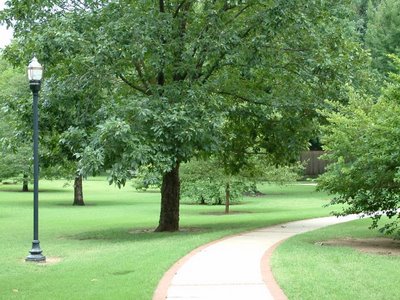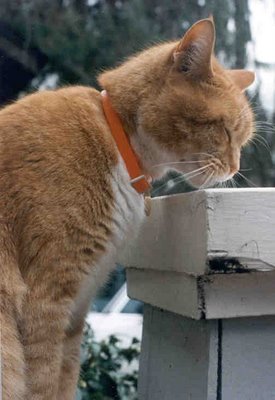Monday, July 31, 2006
At home in your life
Sit quietly and reflect on your life right now. It is changing. The future is unknown; some of your hopes will not be realized - but neither will some of your fears. Also, you are getting older. You are on a journey, moving in a landscape that itself is in constant flux. All these changes constitute "home". Take a few minutes to appreciate where you are now in your life... and feel grateful for it.
This is a meditation about impermanence. Often we perceive impermanence to be something we don't like. But think about it. Without impermanence we could not grow or develop. We would not be able to change in the ways we want to change. So let's cultivate an appreciation for the fact that things continually change.
Sunday, July 30, 2006
Results

Here's a quote by someone I admire very much - Dorothy Day - who is considered a saint by many:
We plant seeds that will flower as results in our lives, so best to remove the weeds of anger, avarice, envy and doubt, that peace and abundance may manifest for all.Of course, from a meditative point of view we realize we can't literally remove those weeds but what we can do is choose not to feed them or give them energy. I think what Dorothy Day is on about is that we don't have to justify these things or be defeated by them. She is also talking about the reality of cause and effect. If we allow anger, avarice, envy and doubt to flourish, they will manifest in very damaging ways. We can avoid that by cultivating compassion, lovingkindness, sympathetic joy and equanimity. That way peace and abundance will truly manifest in our lives and in the lives of those we influence.
Saturday, July 29, 2006
Children and meditation
To introduce children to sitting meditation you are going to be the model to emulate.This is a wonderful way to empower children. Also, it's been shown that meditation helps with ADD and ADHD so this is one more tool for helping children with attention problems.
Everyone sit in a circle with you on a carpet or blanket, facing in to the center, with legs crossed in; hands clasped resting in their lap.
Next, ask the children to copy your special breathing. First explain what you are going to do such as: "We are going to breathe in and out evenly like a little puppy does while taking a nap. On the first count we breathe in (model the in breath), and on the second count we breathe out (model the out breath). Let's all try the even breathing now (let everyone try 3 sets of evenly spaced in and out breathing)."
Try to gear your explanations of the benefit of even breathing to the age group.
If your children are at least school age explain that even breathing like this calms them down when they are stressed or angry. And, that it is a good practice to use that no one else will even know they are doing - it is like their own first aid kit for regaining calm and control of themselves.
If you are working with preschoolers explain that even breathing, like a little puppy resting, also gives them a rest and time to feel better when they have been upset or crying.
Friday, July 28, 2006
The importance of action
Marilyn Bedford sent me the article in which I found this quote:
--His Holiness the Dalai LamaIf our meditation really is based on mindfulness and insight then we will be inspired to take action. Pseudo-meditation - that is, the so-called meditation that is really a form of escapism - is the kind that makes us passive.It is easier to meditate than to actually do something for others. I feel that merely to meditate on compassion is to take the passive option. Our meditation should form the basis for action, for seizing the opportunity to do something.
What an interesting woman
Classical musician. Zen master. Prison activist. Meet Sister Elaine MacInnes: a most remarkable nun.Meditation enables you “to find your silence, to find your quiet, to deal with your anger and to find your self-possession.” What a wonderful description. Let's all allow that to motivate us to be faithful to our meditative practice.
Born in Moncton, N.B. in 1924, Sister Elaine has spent her life on a spiritual journey – one that has taken her from New York's Juilliard School to the convent, and from the serenity of a Buddhist temple to the squalor of British penitentiary cells.
...
Sister Elaine learned the violin from her mother, a gifted musician, and pursued music studies at Mount Allison University and Juilliard, after which she played professionally with symphony orchestras in Calgary and Edmonton. She also fell in love with a handsome English airman, who was killed in action during World War Two. Through it all, she felt a spiritual longing that led her, finally, to a Toronto convent in 1953.
After taking her vows in 1961, Sister Elaine accepted an assignment in Kyoto, Japan – and there found herself drawn to Zen Buddhism. At a monastery deep in the mountains, she began to study meditation with a renowned master, and by 1980 had become the first Canadian ever accredited as a Zen Roshi (teacher).
Missionary work took Sister Elaine to the Philippines during the tumultuous years of revolt against the brutal regime of Ferdinand Marcos. There, she achieved a degree of notoriety for her efforts to teach meditation to political prisoners and victims of torture – often at great personal risk. By the early 1990s she had taken up similar work in UK prisons, as Director of the Prison Phoenix Trust.
Actor Jeremy Irons, patron of the Prison Phoenix Trust, tells the filmmakers that learning meditation is an “extraordinary gift” for those behind bars, making it possible “to find your silence, to find your quiet, to deal with your anger and to find your self-possession” – all of which can be crucial to rehabilitation.
Professor Andrew Coyle, the former governor of Brixton Prison, says Phoenix Trust now operates in nearly half of the country's prisons, and demand for its meditation classes is enormous. He credits Sister Elaine with paving the way for the initial success of the program by winning the trust of inmates: “Prisoners are good judges of people – quick to see through artifice – and can recognize a genuine person.”
Thursday, July 27, 2006
More on happiness
 Photo by Cynthia Burgess
Photo by Cynthia BurgessMany persons have a wrong idea of what constitutes true happiness. It is not attained through self-gratification but through fidelity to a worthy purpose.
-- Helen Keller
Living in community
 Today, while I was looking for another book on my shelves, I came across a little volume I've had for many years. It's called Rule for a New Brother and it's the very beautiful community rule of a Dutch order of religious brothers.
Today, while I was looking for another book on my shelves, I came across a little volume I've had for many years. It's called Rule for a New Brother and it's the very beautiful community rule of a Dutch order of religious brothers.Even if we're not monks or nuns, we can benefit from such a rule. We all live in community - even if we literally live alone. Human beings are social animals and we need each other in order to survive. Here's a lovely little passage that encourages us to cultivate a graciousness in our dealings with others while letting go of ego gratification:
I really like the encouragement that we are to work for each other's happiness and that we are to accept help when needed. It's interesting that those two admonitions are expressed together. Both giving and receiving help are basic to mutual happiness, aren't they? When we refuse help or when we accept it with resentment, we are actually depriving another of the joy of giving.Give instead of demanding,
trust others instead of compelling their trust,
serve instead of being served,
bless instead of cursing.
And be sure that when you have done
all things well
you will still be an unprofitable servant.
So be attentive to the others,
not in order to dominate or exploit them
but to work for their happiness
discreetly and effectively
and to build them up
in all the riches of faith and love.
And you, accept from your companion
the help you need.
Be thankful for the variety of gifts
and difference of personality.
When you put your own potential
and insights at the service of your community
your unity will grow stronger and richer,
and together you will create that spaciousness
which finds room for everyone.
Wednesday, July 26, 2006
Meditation and the work place
Deadlines, quotas and angry bosses, for many of us, its all in a days work. Now, more and more companies are recognizing that stress can impact worker productivity and they are trying to do something about it.We can practice meditation anytime, anywhere. We don't even have to look like we're meditating. We can simply be mindful with whatever we're doing, using the present moment as our meditation support.
Bobby Berman knows all about job stress. As a supply chain assistant for sneaker giant, Reebok, she can have some pretty tense days. But one sunny Tuesday afternoon, Bobby tried something new to relieve her stress. She and about 40 co-workers got a one-hour lesson in the ancient art of meditation.
In a basement conference room, the workers all sat quietly and listened to Richard Geller give step-by-step instructions on some basic meditation techniques.
...
Geller has been practicing meditation for 30 years. He developed a program designed for the corporate environment, where traditional stress relievers aren't practical. “You can’t always go for a run or get a message”, he told the group, “but you can immediately start to practice meditation.”
Job stress is more than just an inconvenience. It’s partly to blame for rising health care costs and it can lead to serious mistakes and reduced productivity. That’s one of the reasons Reebok added the meditation classes to its employee wellness program. “We have so many activities that help strengthen the body, we really wanted something to strengthen the mind,” explained company health promotion manager Ron Bartikewicz.
Tuesday, July 25, 2006
Not just for monks
Senior Spectrum's Coastal Community Center is sponsoring a summer program titled "Meditation's Not Just for Monks," beginning at 9 a.m. on Monday, July 31 and continuing on August 14, 2006. The sessions will be led by Bob and Mary Ann Hoy of St. Andrew's Episcopal Church in Newcastle.
Meditation is an important tool that's being used to reduce stress and lower blood-pressure. It is a way to evoke the relaxation response, strengthen awareness and alleviate depression. It is also an ancient spiritual practice.
"Meditation is spiritual, but not religious," said Bob Hoy. "Spiritual has to do with actual experience, not just beliefs; an awakening to one's true self. Meditation, therefore, is not so much a part of this or that particular religion, but rather of the universal spiritual culture of all humankind. It is an effort to bring awareness to bear on all aspects of life."
Bob Hoy is a Spiritual Director and a retired teacher of 35 years. Mary Ann Hoy is the Associate Rector at St. Andrew's. They have been members of an on-going meditation group for the past 20 years.
I like what Bob Hoy says about meditation being spiritual but not religious. Meditation is about universals; it's about how the mind really works - no matter what the person's belief system happens to be.
Monday, July 24, 2006
Radical gratitude
Even if I should be locked up in a narrow cell and a cloud should drift past my small barred window, then I shall bring you that cloud, Oh God, while there is still the strength in me to do so.
Sharing the benefit
Take a few moments at the end of each session to consciously extend the positive energies that you have accumulated. Radiate that energy outward as light and love, and imagine it touching others as a vibration that calms, energizes, heals, comforts, and nourishes. Be creative! Imagine you are playing a mental video game. Beam all your postive feelings to your friends, family, people you feel neutral toward, even your enemies. Realize that they all, just like you, want to be happy, want to escape suffering and pain and make the most of their lives. Thus, in your own way, you can make the world a more peaceful place to be in.
In this way, you can see that the time you take to master stress is not selfish. In fact, it is an active form of accepting responsibility for and contributing meaningfully to the lives of others. Though at first these mental training techniques may seem imaginary or conceptual, with practice you will find that you are helping - yourself and others.
I find it very beneficial to reflect on the universal motivation - that is, the desire to be happy. Everyone wants this and that realization helps me contemplate my connection with all beings. When I meditate, I am helping myself learn how to be happy and I then reflect, since I am connected to others, that my happiness is connected to their happiness. This helps me in my willingness to share the benefit even with people I experience as difficult.
Sunday, July 23, 2006
Interior reality
Saturday, July 22, 2006
Why meditation is important
The question Wilber is posing is this: Do we want to grow or or do we want to stay stuck? Personally, I want to keep growing so choosing not to meditate is just not an option I want to consider.If we - you and I - are to further the evolution of mankind, and not just reap the benefit of past humanity's struggles, if we are to contribute to evolution and not merely siphon it off, if we are to help the overcoming of our self-alienation from Spirit and not merely perpetuate it, then meditation - or a similar and truly contemplative practice - becomes an absolute ethical imperative, a new categorical imperative... Meditation is simply what an individual at this present stage of average-mode consciousness has to do in order to go beyond that stage in his or her own case.
-- Ken Wilber
Friday, July 21, 2006
Neighbors
Crossing the Road for One Another
We become neighbours when we are willing to cross the road for one another. There is so much separation and segregation: between black people and white people, between gay people and straight people, between young people and old people, between sick people and healthy people, between prisoners and free people, between Jews and Gentiles, Muslims and Christians, Protestants and Catholics, Greek Catholics and Latin Catholics.
There is a lot of road crossing to do. We are all very busy in our own circles. We have our own people to go to and our own affairs to take care of. But if we could cross the street once in a while and pay attention to what is happening on the other side, we might become neighbours.
The meditative tradition says that we are not really separate but rather that we are profoundly connected. The willingness to "cross the road" for each other helps us to realize, appreciate and celebrate that connectedness.
Thursday, July 20, 2006
Settling the restless mind
Our mind is like a glass of water in which dirt particles have been stirred. We cannot command the water to become clear, but if we allow the glass to sit for a while, the impurities may gradually settle to the bottom, or rise to the surface of their own accord, to be skimmed off.I've always liked the illustration of the dirty water being allowed to settle. It's so obvious, isn't it, that we can't pick individual particles out of water and clean it that way. Likewise, we can't force our mind to be clear and spacious. But we can stop stirring things up. Simply letting go of thoughts without judgment and gently returning to the meditation support allows the mind to settle. With practice it becomes habitual and a reliable way to refresh the mind.
We don't realise how restless the mind is. When we sit to meditate, we may be aghast to find how our consciousness seethes and roils with one idea after the other. But let us continue calmly to discipline this fractious colt, the mind! It will gradually behave, as we want it to.
Wednesday, July 19, 2006
Your own experiment
The mystics ask you to take nothing on mere belief. Rather, they give you a set of experiments to test in your own awareness and experience. The laboratory is your own mind, the experiement is meditation.
-- Ken Wilber
Tuesday, July 18, 2006
Sharpening our perceptions
 I often encounter the belief that meditation is about withdrawing from the world or thinking lofty thoughts. Here's a comment by Chögyam Trungpa that speaks to this misconception:
I often encounter the belief that meditation is about withdrawing from the world or thinking lofty thoughts. Here's a comment by Chögyam Trungpa that speaks to this misconception:I really like the knife sharpening analogy. If we see challenging situations in our life as the stone that will sharpen our awareness, we will alleviate much suffering in ourselves.One should realize that one does not meditate in order to go deeply into oneself and withdraw from the world... There should be no feeling of striving to reach some exalted or higher state, since this simply produces something conditioned and artificial that will act as an obstruction to the free flow of the mind... When performing the meditation practice, one should develop the feeling of opening oneself out completely to the whole universe with absolute simplicity and nakedness of mind.... Meditation is not to develop trance-like states; rather it is to sharpen perceptions, to see things as they are. Meditation at this level is relating with the conflicts of our life situations, like using a stone to sharpen a knife, the situation being the stone.
Monday, July 17, 2006
Potential
I have no doubt whatever that most people live, whether physically, intellectually, or morally, in a very restricted circle of their potential being. They make use of a very small portion of their possible consciousness... much like a man who, out of his whole bodily organism, should get into a habit of using and moving only his little finger.... We all have reservoirs of life to draw upon, of which we do not dream.
Now look at this one by Václav Havel about what will really change the world:
Without a global revolution in the sphere of human consciousness, nothing will change for the better in the sphere of our being as humans... The salvation of this human world lies nowhere else than in the human heart, in the human power to reflect, in human meekness and in human responsibility.
If we just begin to realize the potential of consciousness that lies within each of us, we can make our genuine contribution to change for the better. Don't ever give in to the temptation to believing that your meditation is somehow just for you - that it's selfish. It is not. It is part of the shift of worldwide consciousness that is necessary for us to survive as a species. Don't give up!
Sunday, July 16, 2006
Claiming peace
Before me peaceful
Behind me peaceful
Under me peaceful
Over me peaceful
Around me peaceful-- Traditional Navajo Prayer
Saturday, July 15, 2006
Tree meditation
Tree culturist P.G. Cross thinks we should all get up-close and personal with trees: "If you would live life in all its richness, then make friends with your trees, your neighbor's trees, the trees of the hillside and the highway. To form such a friendship means serenity of being, better health, and above all, lasting happiness. No tree ever proves to be a false friend." Befriend a tree for the summer. Look out for its welfare. Notice its moods. Sit beside it and bask in its energy.And while you're at it, plant one. You'll be offsetting some carbon emissions pollution when you do.
Appreciation
Feeling grateful or appreciative of someone or something in your life actually attracts more of the things that you appreciate and value into your life.
Stress management
A lecturer, when explaining stress management to an audience, raised a glass of water and asked, "How heavy is this glass of water?"
Answers called out ranged from 20g to 500g.
The lecturer replied, "The absolute weight doesn't matter. It depends on how long you try to hold it. If I hold it for a minute, that's not a problem. If I hold it for an hour, I'll have an ache in my right arm. If I hold it for a day, you'll have to call an ambulance. In each case, it's the same weight, but the longer I hold it, the heavier it becomes."
He continued, "And that's the way it is with stress management. If we carry our burdens all the time, sooner or later, as the burden becomes increasingly heavy, we won't be able to carry on. As with the glass of water, you have to put it down for a while and rest before holding it again. When we're refreshed, we can carry on with the burden."
So, before you return home tonight, put the burden of work down. Don't carry it home. You can pick it up tomorrow. Whatever burdens you're carrying now, let them down for a moment if you can.
So, my friend, why not take a while to just simply RELAX. Put down anything that may be a burden to you right now. Don't pick it up again until after you've rested a while.
The way we rest is by meditating. Meditation is the best stress reduction technique going!
Friday, July 14, 2006
More on expectation
Letting go of expectations does not mean adopting a defeatist attitude - no, not at all. There's nothing wrong with being optimistic! Of course we want to maintain a positive attitude throughout our approach to our lives. The opposite to that would be to engage in catastrophic thinking which often becomes a self-fullfilling prophecy. The problem with expectation comes when we have to have a certain outcome in order to be okay. Here's an excerpt from a little article called, "Psychological Benefits of Meditation" that expands on this:
"Meditation frees persons from tenacious preoccupation with the past and future and allows them to fully experience life's precious moments", says Daeja Napier, founder of the Insight Meditation Center and lay dharma teacher of insight meditation in suburban Boston.
"Many men and women tend to live in a state of perpetual motion and expectation that prevents them from appreciating the gifts that each moment gives us," says Napier. "We live life in a state of insufficiency, waiting for a mother to love us, for a father to be kind to us, for the perfect job or home, for Prince Charming to come along or to become a perfect person. It's a mythology that keeps us from being whole.
"Meditation is a humble process that gently returns us to the now of our lives and allows us to wake up and re-evaluate the way that we live our lives," says Napier. "We realize that the only thing missing is mindfulness, and that's what we practice."
The kind of expectation that leaves us in a perpetual "state of insufficiency" is the kind that is unskillful. Let life unfold. (It will unfold whether you "let it" or not!) Stay open to whatever is. Remember impermanence. And in all things cultivate compassion - for yourself and for others. This way we will be at peace with ourselves and in a state of inner harmony no matter what.
Thursday, July 13, 2006
Patience with oneself
Quite a number of the people I have worked with individually over the years have experienced suffering because they don't live up to what I call the "idealized self image". They have the mistaken belief that if they judge themselves harshly that somehow they will do better. Well, today I came across a wonderful quotation that speaks to that:
Well, he's talking about equanimity, isn't he? I like the point that we will not really correct our faults if we fret about them. That's been my experience - with both myself and in observing others. Deep acceptance is paradoxically what helps us change.Be patient with everyone, but above all with yourself. I mean do not be disheartened by your imperfections, but always rise up with fresh courage. How are we to be patient in dealing with our neighbor's faults if we are impatient in dealing with our own? He who is fretted by his own failings will not correct them. All profitable correction comes from a calm and peaceful mind.
Wednesday, July 12, 2006
The problem with expectations
I want to share with you a passage from an interesting essay by Frederic and Mary Ann Brussat called, "Great Expectations: They cause us more harm than good". Here it is:
Expectations can be a big stumbling block for us, both personally and communally. There is an old story about a man who hunted rabbits. One day when he was out in the woods, a rabbit ran past him and collided with a tree stump, knocking itself unconscious. The man couldn't believe his good fortune as he put the rabbit in his game bag. Every day for the rest of his life, he came back and watched the stump, waiting for this to happen again.I learned to tame my expectations years ago when I found myself getting tense about a vacation I was about to take. I was full of expectations about how wonderful it was going to be and, interestingly, experiencing some anxiety that my expectations were not going to be fulfilled. In a real breathrough moment, I decided that my only goal for the vacation was to get to my destination and to get back. That was all. If that happened, I would pronounce the vacation a success. That way everything else was icing on the cake. I've had that attitude toward travel ever since. Such an approach allows us to enjoy events as they unfold rather than constantly comparing them to what we thought we wanted. Much suffering is thereby avoided!
When we participate in some activity, especially something we've done before, we often have big expectations about what will happen, how we will feel, and what the end result will be. When all does not go as expected, we are disappointed. Usually we then look around for someone or something to blame.
Fred calls himself a recovering expecter. He's had the most trouble with expectations in his friendships. Expecting to match the intimacy, equality, and intensity of a meaningful childhood friendship has gotten in the way of his adult friendships. He has had to learn to approach each friend with an open heart and not burden the relationship with his previous experience.
Wisdom and love
What would happen if we just let life flow and not analyzed it too much? Maybe wisdom and love would be reliably and equally real to us.Wisdom tells me I am nothing.
Love tells me I am everything.
And between the two my life flows.
Tuesday, July 11, 2006
Illumination
Even if our efforts of attention seem for years to be producing no result, one day a light that is in exact proportion to them will flood the soul.
-- Simone Weil
Understanding pain
[T]he greatest suffering does not come from the torn or rotting flesh, or the tumor or the bedsores, but from their mental interpretation and response to the situation. Fear, helplessness, frustration, anger, guilt, and blame are clearly effective methods of intensifying the pain, constricting the body and mind to isolate, contract, and cut off that part of oneself from healing. Those who learn to open to pain, to investigate it and allow it to change, flow, and float freely in their bodies, take the first step toward mastering pain. Though this openness does not mean that the pain will go away, it does create a mental and emotional space in which pain is no longer related to as the enemy or as an emergency. With this openness we are able to accept, nurture, and love the part of us that is in pain. If we then bring the same quality of openness and reflection to our thoughts and emotional feelings, we will learn to recognize both the patterns of mind that intensify our suffering and the patterns of mind that bring greater harmony. In this way we become more responsible for optimizing our own self-healing potentials.
To sum up: resisting the pain makes it worse. Accepting the pain makes it better. It's as simple as that.
Monday, July 10, 2006
The importance of generosity
The practice of generosity can serve as a corrective to addictive consumerism. Generosity enacts the quality of nongreed; it is a willingness to share, to let go. It may be giving of time, energy, resources, love, and even in rare cases, one's own life for the benefit and welfare of others. Generosity weakens the tendency of attachment and grasping and is intimately connected with the feeling of lovingkindness. People who experience the power and joy of generosity will also experience its effect on consuming. The cultivation of generosity offers a very strong antidote to the wanting mind and would be a powerful corrective if taken up in a widespread way across our culture.
To cultivate generosity directly is another fundamental part of living a spiritual life. Like the training precepts and like our inner meditations, generosity can actually be practiced. With practice, its spirit forms our actions, and our hearts will grow stronger and lighter. It can lead to new levels of letting go and great happiness.
What would happen if we made giving more important that getting in our lives? Wouldn't we be much more free in our spirits?
The wounded healer
This passage speaks to the importance of self care. We need to spend time with someone who is skilled in listening and helping - who can assist us in binding up our own wounds - before we try to help others.Listening With Our Wounds
To enter into solidarity with a suffering person does not mean that we have to talk with that person about our own suffering. Speaking about our own pain is seldom helpful for someone who is in pain. A wounded healer is someone who can listen to a person in pain without having to speak about his or her own wounds. When we have lived through a painful depression, we can listen with great attentiveness and love to a depressed friend without mentioning our experience. Mostly it is better not to direct a suffering person's attention to ourselves. We have to trust that our own bandaged wounds will allow us to listen to others with our whole beings. That is healing.
Sunday, July 09, 2006
Working skillfully with pain

Yesterday I brought you a passage from The Fine Arts of Relaxation, Concentration and Meditation by Joel and Michelle Levey on the subject of pain. I want to share another paragraph from the same chapter today:
Traditionally, different meditation techniques have been used effectively to cope with or master pain. Though concentrative techniques can be effective at masking the pain, the emphasis of applying meditation to working with pain is that of directly investigating and understanding it. Upon careful examination of the field of sensations that we label "pain," we find that it is not a thing or unchanging entity. Rather pain is a nonentity, a dynamic field of sensations and feelings that changes with each moment and with each state of mind. The courage to face and understand our own suffering is the first step to working effectively with our own pain. It is also the first step in learning to open our hearts and minds enabling us to empathize and compassionately relate to the sufferings of others. By understanding our own wish to be free from our suffering, we begin to develop greater compassion, wishing that others might be free as well.
Although the above process is easier to practice with physical pain, it is also very effective with mental or emotional pain. Simply being a meditator does not mean we will not feel pain when something terrible happens. But as meditators we have skills for relating with our pain in a way that will reduce our suffering and bring us insight.
Saturday, July 08, 2006
About pain
The Dalai Lama often reminds his students that the goal of the path of meditation is to fully awaken to our true nature and to become enlightened. To become enlightened, he has pointed out, we must perfect compassion, and to perfect compassion, we must encounter suffering. Taking this teaching to heart, a natural next reflection is that if this is really true, then what is the real meaning of pain or suffering in our lives and in our world?I do think that the purpose of life is to cultivate compassion and to offer it both to ourselves and to others. In the next few days we'll look at more of what the Leveys have to say about working skillfully with pain.
Pain, suffering, loss, and dissatisfaction invite us onto a path of soul searching, self-refection, and transformation. If instead of turning away or dulling our experience, we embrace and investigate it and allow it to open our hearts and minds to a deeper compassion and insight, there is great liberating potential in this.
Friday, July 07, 2006
The boundless sky
Sit where you have an unrestricted view of the sky - outside if weather permits. Gaze at it with softly focused eyes. (Do not look directly at the sun, or you may do serious harm to your eyes.) Imagine that all thoughts, sensations, habits, doubts and worries are dissolving into the vast openness. Whenever a thought arises, or there is tension in your body, imagine that with each breath more and more space gathers around the tension, until it disappears into the boundless sky.
Anything that can help us cultivate an experience of spaciousness is all to the good. I would also recommend trying this as a visualization when a view of the sky is not accessible for you. After you've practiced this with the actual sky a few times, it will be quite possible to see the sky in your mind's eye and do the meditation that way.
Thursday, July 06, 2006
We all need to remember this:
Seven blunders of the world that lead to violence: wealth without work, pleasure without conscience, knowledge without character, commerce without morality, science without humanity, worship without sacrifice, politics without principle.
--Mahatma Gandhi (1869-1948)
Wednesday, July 05, 2006
The power of aspiration
The longing for the immensity of the sea is our aspiration for wisdom and inner liberation. The tasks of building the ship are the the exercises, the practices, of mindtraining and meditation. If we genuinely "long for the endless immensity of the sea" we will not mind the discipline involved in actually training our mind.If you want to build a ship, don't drum up people together to collect wood and don't assign them tasks and work, but rather teach them to long for the endless immensity of the sea.
Tuesday, July 04, 2006
 Let us remember today the radical ideas of the Founding Fathers and practice gratitude for their courage. The following quotation really seems to fit today:
Let us remember today the radical ideas of the Founding Fathers and practice gratitude for their courage. The following quotation really seems to fit today:~ Ching Ning ChuAcquire the courage to believe in yourself. Many of the things that you have been taught were at one time the radical ideas of individuals who had the courage to believe what their own hearts and minds told them was true, rather than accept the common beliefs of their day.
Happy Independence Day!
Monday, July 03, 2006
Oh, I like this!
Throwing away ideas too soon is like opening a package of flower seeds and then throwing them away because they're not pretty.
A practice of love
The practice of meditation -- mindfulness -- is for me a practice of love. Unconscious love is an oxymoron, an impossibility. To be fully present with oneself and others, I believe, is the truest love there is. Our courage to enter the darkest recesses of our hearts and minds births a deliverance from all that has kept us tight, disconnected and loveless for so long. We forget and we remember.
Sunday, July 02, 2006
Expect Nothing
Expect nothing. Live frugally
On surprise.
Become a stranger
To need of pity
Or, if compassion be freely
Given out
Take only enough.
Stop short of urge to plead
Then purge away the need.
Wish for nothing larger
Than your own small heart
Or greater than a star;
Tame wild disappointment
With caress unmoved and cold.
Make of it a parka
For your soul.
Discover the reason why
So tiny human midget
Exists at all
So scared unwise.
But expect nothing. Live frugally
On surprise.
Saturday, July 01, 2006
Love transforms
Love transforms you from death into life: it quickens you to be able to see where you cannot see and feel where you cannot feel.



















